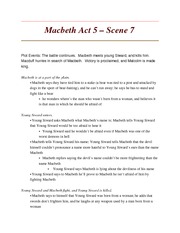Macbeth Act 1 Summary
- Posted in:Admin
- 19/03/18
- 28
Get free homework help on William Shakespeare's Macbeth: play summary, scene summary and analysis and original text, quotes, essays, character analysis, and. Start studying Summary for Act 1-5 'Macbeth'. Learn vocabulary, terms, and more with flashcards, games, and other study tools.
Our initial impression of, based on the captain’s report of his valor and prowess in battle, is immediately complicated by Macbeth’s obvious fixation upon the witches’ prophecy. Macbeth is a noble and courageous warrior but his reaction to the witches’ pronouncements emphasizes his great desire for power and prestige. Macbeth immediately realizes that the fulfillment of the prophecy may require conspiracy and murder on his part. He clearly allows himself to consider taking such actions, although he is by no means resolved to do so.

His reaction to the prophecy displays a fundamental confusion and inactivity: instead of resolving to act on the witches’ claims, or simply dismissing them, Macbeth talks himself into a kind of thoughtful stupor as he tries to work out the situation for himself. In the following scene, will emerge and drive the hesitant Macbeth to act; she is the will propelling his achievements. Once Lady Macbeth hears of the witches’ prophecy, Duncan’s life is doomed. Macbeth contains some of Shakespeare’s most vivid female characters.
Lady Macbeth and the three witches are extremely wicked, but they are also stronger and more imposing than the men around them. The sinister witches cast the mood for the entire play. Their rhyming incantations stand out eerily amid the blank verse spoken by the other characters, and their grotesque figures of speech establish a lingering aura. Whenever they appear, the stage directions deliberately link them to unease and lurking chaos in the natural world by insisting on “Thunder” or “Thunder and lightning.” Shakespeare has the witches speak in language of contradiction. Their famous line “Fair is foul, and foul is fair” is a prominent example (1.1.10), but there are many others, such as their characterization of Banquo as “lesser than Macbeth, and greater” (1.3.63). Such speech adds to the play’s sense of moral confusion by implying that nothing is quite what it seems.
Interestingly, Macbeth’s first line in the play is “So foul and fair a day I have not seen” (1.3.36). This line echoes the witches’ words and establishes a connection between them and Macbeth. World Air Transport Statistics 56th Edition Peters. It also suggests that Macbeth is the focus of the drama’s moral confusion.

Expandrive Serial Podcast. Scene I of Act I of Macbeth begins with three witches or, as they are referred to in the play on some occasions, the three weird sisters. The sisters gather round and make plans to confront Macbeth while a storm rages in the background.
Weather in Shakespeare plays is often notable, and this is certainly the case here. The witches, supernatural and powerful, are dangerous just as the raging storm is. One of the witches also utters a key phrase in this scene stating, 'fair is foul and foul is fair.' Basically, this idea means that good is bad and bad is good or, in other words, that nothing is exactly as it seems or as it should be. This is an idea that will be echoed time and time again in the play.
Scene II then pans over to a recent battle between King Duncan of Scotland and a group of invaders, led by a rebel named MacDonwald. The king has also been pitted against an army from Norway, allied with the Thane of Cawdor. A captain reports having seen Macbeth and Banquo fight bravely against the rebels and, in particular, Macbeth killed the traitorous MacDonwald. As a reward, King Duncan determines to give Macbeth the title of Thane of Cawdor and sends Ross as his messenger to deliver to news to Macbeth. The following scene then shifts again, this time to a location near the battlefield, where the witches have gathered once more. The discussion between the witches here is quite revealing about their characters. One remarks that she has been off killing swine, while another tells how she is plotting revenge on a woman's husband because the woman refused to give the witch some of the chestnuts she was snacking on.
Clearly, these witches are not pleasant beings. Macbeth and Banquo stumble across these witches, commenting that they 'look not like th' inhabitants o' th' earth,' meaning they look supernatural in their appearance. The witches greet Macbeth by calling him Thane of Glamis-the title that he already holds. However, the witches then hail him as Thane of Cawdor.
Macbeth is, of course, puzzled by this, not knowing why they would greet him by another man's title. This is a key example of dramatic irony. Dramatic irony is when the audience knows something that a character does not. Here, the audience knows that Duncan is already planning to make Macbeth Thane of Cawdor, but Macbeth has no idea. Finally, the witches hail Macbeth as future king. Laughing, Banquo demands his own fortune of them, and the witches tell Banquo he will be both greater and lesser than Macbeth because his sons shall be kings.